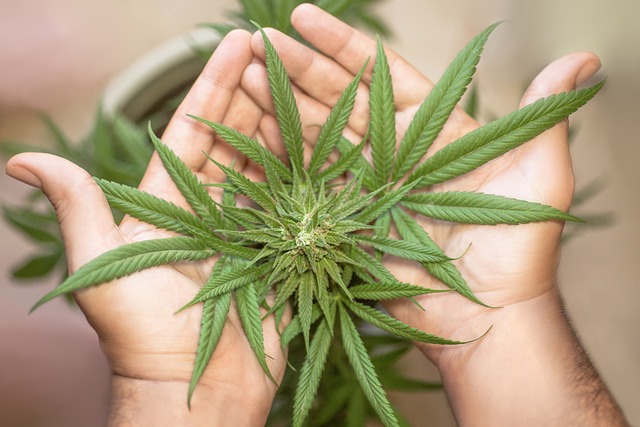The THCA flower, a natural component of cannabis, has garnered scientific attention for its therapeutic properties, distinct from the psychoactive effects of THC. Rich in cannabinoids, THCA offers a non-psychoactive alternative with preliminary evidence suggesting it may alleviate inflammation and pain, potentially benefit neurological disorders, and aid in managing symptoms associated with conditions like arthritis. Its interaction with the endocannabinoid system is believed to contribute to these health benefits, also providing anti-nausea effects particularly useful for chemotherapy patients. The entourage effect, which occurs when THCA is consumed as part of the whole cannabis flower, enhances its therapeutic potential further. As research continues and legal restrictions ease, the exploration of THCA flower effects and benefits for various health conditions is likely to expand, offering new prospects in healthcare and wellness.
exploration into the burgeoning field of cannabinoid research reveals significant insights into the therapeutic potential of THCA (Tetrahydrocannabinolic Acid) flower. This article delves into the multifaceted effects and benefits of this non-psychoactive cannabis compound, shedding light on its healing properties and health advantages. From alleviating pain to offering neuroprotective effects, the THCA flower’s impact on well-being is a subject of growing interest and importance in various therapeutic applications. Join us as we dissect the science behind these benefits and consider how this natural substance may contribute to a holistic health regimen.
- Unveiling the Therapeutic Properties of THCA Flower: A Deep Dive into Its Healing Effects and Benefits
Unveiling the Therapeutic Properties of THCA Flower: A Deep Dive into Its Healing Effects and Benefits

THCA, or tetrahydrocannabinolic acid, is a non-psychoactive precursor to THC found in the cannabis plant. The THCA flower, which is rich in this compound, has garnered attention for its potential therapeutic properties. Preliminary research suggests that THCA may offer a range of health benefits without the psychoactive effects typically associated with its decarboxylated form, THC. One of the notable effects of THCA is its anti-inflammatory action, which could be beneficial for conditions like arthritis. Additionally, studies indicate that THCA may have neuroprotective qualities, potentially aiding in the management of neurological disorders. Its interaction with the endocannabinoid system has been linked to benefits in pain management and may contribute to its anti-nausea effects, which are particularly relevant for individuals undergoing chemotherapy. The entourage effect, where THCA interacts synergistically with other cannabinoids and terpenes present in the flower, further enhances its potential therapeutic benefits. As such, the THCA flower holds promise as a natural remedy with multifaceted effects and benefits for various health concerns.

Delta-9-tetrahydrocannabinolic acid (THCA) is a naturally occurring compound found in cannabis flowers that has garnered attention for its potential therapeutic effects and health benefits. Unlike its psychoactive counterpart, delta-9-THC, THCA exists in raw cannabis or when cannabis is harvested uncured. Research suggests that THCA may possess anti-inflammatory, antibacterial, and neuroprotective properties, making it a subject of interest for various health applications. Preliminary studies indicate that THCA interacts with the body’s endocannabinoid system, which regulates a range of functions and processes, including pain, immune response, and mood. As such, the benefits of THCA flower effects are multifaceted, potentially aiding in conditions ranging from chronic pain to neurodegenerative diseases.
The potential health advantages of THCA are supported by anecdotal evidence and ongoing scientific research. Advocates for cannabis therapy often report that THCA-rich products can help alleviate symptoms associated with various ailments, such as arthritis and multiple sclerosis. Furthermore, its non-psychoactive nature makes it appealing to individuals seeking the therapeutic effects of cannabinoids without the high typically associated with cannabis consumption. As legal restrictions continue to ease across various regions, there is an increasing opportunity for further research to elucidate the full spectrum of THCA flower benefits, potentially leading to new and innovative applications in healthcare and wellness.
The exploration of THCA flower’s therapeutic properties reveals a promising potential in natural wellness. Its healing effects, which include anti-inflammatory and neuroprotective qualities, make it an intriguing subject for further scientific investigation. Users report a range of benefits from its use, suggesting that THCA flower may offer a valuable addition to health-focused routines. As research continues to unfold the nuances of its effects and benefits, it’s clear that this cannabinoid could play a significant role in complementary healthcare strategies.
